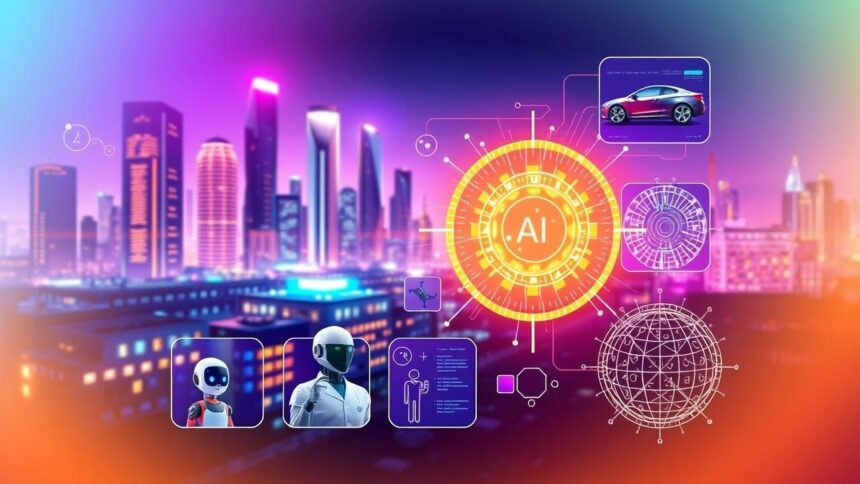What is Artificial Intelligence?
Artificial Intelligence (AI) is a groundbreaking field that leverages computer systems to perform tasks that typically require human intelligence. These tasks include learning, reasoning, problem-solving, perception, and language understanding. In essence, AI refers to machines and software that can mimic cognitive functions to achieve specific goals. The journey of AI began in the 1950s, and over the decades, it has evolved to become a pivotal component in various industries, from healthcare to finance, improving efficiency and innovation.
The Evolution of AI
The concept of artificial intelligence has a rich history. Early theoretical work date back to the 1940s and 1950s, with pioneers like Alan Turing and John McCarthy laying the foundation. Turing’s famous “Turing Test” proposed a measure of a machine’s ability to exhibit intelligent behavior equivalent to, or indistinguishable from, that of a human. McCarthy coined the term “artificial intelligence” during the Dartmouth Conference in 1956, marking the beginning of a revolutionary era.
Over the years, AI has gone through multiple phases:
- Early AI (1950s-1960s): Concentrated on solving mathematical problems and basic logic puzzles.
- Expert Systems (1970s-1980s): Focused on using AI for specialized, knowledge-based systems to assist experts.
- Machine Learning (1990s-Present): Shifted towards systems that can learn and improve from data without explicit programming.
The Importance of Artificial Intelligence
Artificial Intelligence holds immense importance in today’s world. Its ability to process vast amounts of data, identify patterns, and make decisions at speeds far beyond human capabilities makes it indispensable. AI is transforming industries by automating repetitive tasks, enhancing decision-making processes, and providing predictive insights. For instance, in healthcare, AI can assist in diagnose diseases more accurately and efficiently, while in finance, it helps detect fraud and manage risk.
Applications of Artificial Intelligence
AI’s applications are vast and diverse. From everyday tasks to complex industrial processes, artificial intelligence is making its mark across multiple sectors:
- Finance: AI algorithms analyze market trends, automate trading, and detect fraudulent activities.
- Healthcare: AI assists in diagnosing diseases, predicting patient outcomes, and personalizing treatment plans.
- Retail: AI enhances customer experiences through personalized recommendations and improving inventory management.
- Manufacturing: AI optimizes supply chains, predicts maintenance needs, and automates quality control processes.
- Transportation: AI powers autonomous vehicles, optimizes routes, and enhances public transport scheduling.
Getting Started with Artificial Intelligence
For those looking to delve into the world of AI, getting started can seem daunting. However, with the right resources and approach, anyone can begin their journey in artificial intelligence. The key is to start with the basics and gradually build expertise through hands-on experience and continuous learning.
The Essential Components of AI
Before diving into artificial intelligence, it is crucial to understand its essential components:
- Machine Learning: A subset of AI that focuses on algorithms and statistical models that allow computers to perform tasks without explicit instructions. They learn from data and improve over time.
- Deep Learning: A subfield of machine learning that uses neural networks to model complex patterns in data. It is particularly effective for image and speech recognition.
- Natural Language Processing (NLP): Enables machines to understand, interpret, and generate human language. It is crucial for applications like chatbots and language translation.
- Computer Vision: Allows machines to interpret and make decisions based on visual data from the world. It is used in applications like facial recognition and autonomous driving.
Tools and Resources for Learning AI
To get started with AI, you need access to the right tools and resources. Here are some popular platforms and resources:
- Programming Languages: Python is the most widely used language in AI. Other languages like R and Java are also popular.
- Frameworks and Libraries:
- TensorFlow: An open-source framework for machine learning developed by Google.
- PyTorch: Another popular open-source deep learning framework.
- Scikit-learn: A simple and efficient tool for data mining and data analysis.
- Courses and Certifications:
- Coursera and edX offer excellent AI courses from top universities.
- Udacity provides nanodegree programs in AI and machine learning.
Additionally, online communities and forums like Stack Overflow, Reddit’s r/MachineLearning, and AI-focused GitHub repositories can be invaluable for support and collaboration.
The Benefits of Artificial Intelligence
Integrating AI into various domains brings numerous benefits. Artificial Intelligence can enhance efficiency, accuracy, and innovation, leading to better outcomes and significant cost savings. Let’s explore some of the key advantages:
Improved Decision Making
AI’s ability to analyze vast amounts of data quickly and accurately provides valuable insights that aid decision-making. For instance, in business, AI can analyze market trends and customer behavior to inform strategic decisions. In healthcare, AI can help physicians predict patient outcomes and choose the best treatment options.
Enhanced Efficiency
AI can automate repetitive tasks, freeing up human time and resources for more complex and creative activities. This automation results in increased productivity and reduced operational costs. For example, in manufacturing, AI-powered robots can perform assembly tasks faster and more accurately than human workers.
Error Reduction
Human error is inevitable, but AI can significantly reduce mistakes by performing tasks with high precision and consistency. In industries like finance and aviation, where errors can have severe consequences, AI can ensure accurate transactions and safe operations.
Personalized User Experiences
AI enables personalized user experiences by analyzing individual preferences and behavior. For instance, recommendation systems in e-commerce and streaming services use AI to suggest products or content tailored to users’ interests, enhancing customer satisfaction and engagement.
Challenges and Ethical Considerations in AI
While AI offers numerous benefits, it also presents challenges and ethical considerations that need to be addressed. Understanding these issues is crucial for developing responsible and sustainable artificial intelligence.
Data Privacy and Security
The use of AI often involves collecting and analyzing large amounts of data, raising concerns about data privacy and security. Ensuring that data is collected, stored, and used ethically is paramount. Organizations must implement robust security measures to protect sensitive data from breaches and misuse.
Bias and Fairness
AI systems can perpetuate and even amplify existing biases if not carefully designed. Bias in AI can lead to unfair outcomes, such as discrimination in hiring or lending decisions. It is essential to develop AI algorithms that are fair and unbiased, promoting inclusivity and equity.
Job Displacement
The automation of tasks through AI raises concerns about job displacement. While AI can create new job opportunities, it also threatens to replace certain roles, particularly those involving repetitive tasks. Addressing this challenge requires investments in workforce training and skill development to help individuals adapt to an AI-driven workplace.
The Future of Artificial Intelligence
The future of AI holds tremendous potential for innovation and growth. As technology continues to evolve, AI will become increasingly integrated into our daily lives and industries. Here are some trends shaping the future of artificial intelligence:
Advancements in Machine Learning
Advances in machine learning algorithms and techniques will enable AI systems to learn and adapt more quickly and accurately. This will lead to more sophisticated applications and improved performance across various sectors.
Expansion of AI in Emerging Technologies
AI will play a crucial role in the development of emerging technologies like IoT (Internet of Things), autonomous vehicles, and smart cities. The integration of AI with these technologies will revolutionize how we live and work, creating new opportunities and challenges.
Ethical AI and Regulation
As AI becomes more pervasive, there will be a growing emphasis on ethical considerations and regulation. Governments and organizations will need to develop guidelines and policies to ensure AI is used responsibly and for the benefit of society.
Conclusion
Artificial Intelligence is transforming the world, offering unprecedented opportunities for innovation and growth. From improving decision-making and efficiency to enhancing customer experiences and personalization, AI is reshaping industries and our daily lives. Understanding the basics of AI, its components, applications, and ethical considerations is essential for anyone looking to unlock its power. As we move forward, embracing AI responsibly and ethically will be crucial for building a sustainable and inclusive future.









